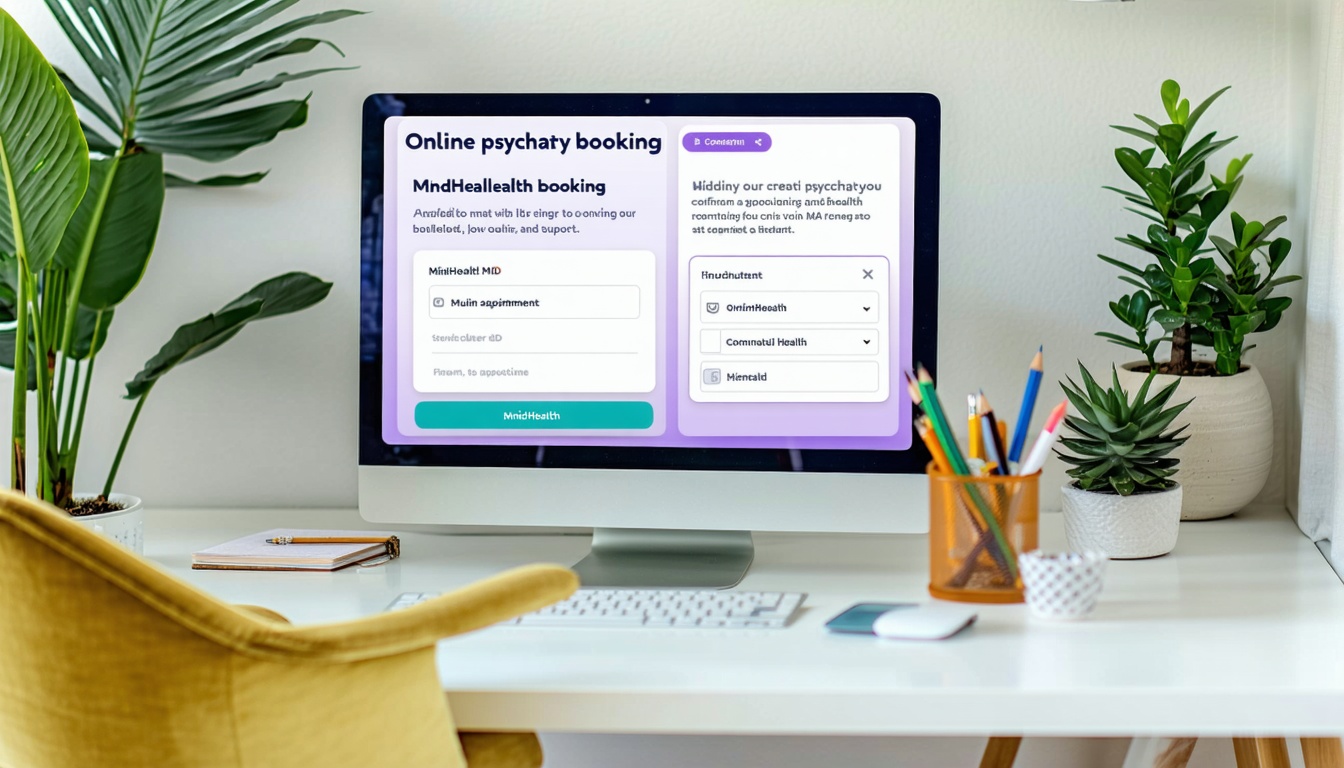If you or a loved one has been looking to book anxiety treatment, you’re probably well aware of how overwhelming it feels to navigate all the options out there. Anxiety isn’t just daily stress—it’s an ongoing sense of fear, worry, or dread that can truly alter how you engage with work, relationships, and personal goals. The good news is that effective help exists, and you don’t have to tackle your anxiety alone.
At MindHealth MD, we understand that no two journeys are the same. That’s why we offer comprehensive telehealth psychiatry, medication assisted treatment (MAT), and TMS therapy, carefully tailored to each individual. Our mission is simple: to help you or your loved one feel supported, empowered, and prepared for a fulfilling life. In this post, we’ll walk you through what anxiety is, why it happens, and which treatments can help—plus we’ll show you how MindHealth MD stands out as a compassionate, authoritative provider for all things mental health. Let’s dive in.
Recognize anxiety signs
Anxiety is more than an occasional worry. According to the Mayo Clinic [1], anxiety disorders involve persistent and excessive fear that can disrupt your daily routine. You might notice:
- Constant restlessness or nervous energy, even when things are going smoothly.
- Difficulty focusing on tasks at work or chores at home.
- Physical symptoms like trembling, sweating, rapid heart rate, or even dizziness.
- Irrational fears or avoidance of certain places or activities.
When these signs stick around or worsen over time, it’s not a matter of “just push through.” It could indicate a clinical anxiety disorder in need of professional support. You may also experience panic attacks: sudden bursts of intense fear accompanied by chest tightness, difficulty breathing, and a sense of impending doom. These episodes can be alarming, yet they’re treatable with the right care.
When to seek help
It’s crucial to seek help before your worries feel insurmountable. If you’ve started skipping social events or avoiding school or work responsibilities because of fear, or if your relationships are under strain, consider reaching out. With accessible solutions like a book psychiatric appointment or immediate psychiatry appointment, you don’t have to power through anxiety on your own. Early intervention often leads to faster progress and lowers the chance of your symptoms worsening.
Explore root causes
While it might feel like anxiety shows up out of nowhere, there are root causes that can contribute to its development. By identifying these factors, you can gain a clearer picture of how to move forward—which is especially helpful when you book anxiety treatment for yourself or someone you care about.
- Biological predisposition: Family history plays a role, suggesting that some people are more likely to experience anxiety if a parent has had it too [2].
- Life experiences: Trauma in childhood, stressful relationships, or ongoing financial difficulties can act as triggers [3].
- Societal pressures: From the pressure to succeed in your career to unrealistic body ideals, modern society can fuel fear, perfectionism, and chronic worry.
- Certain health issues: Thyroid dysfunction, heart arrhythmias, and even specific prescription drugs can spur or amplify anxiety [1].
Putting these pieces together can help you see why you feel the way you do, or why a loved one is battling excessive worry. Context matters, and so does seeking professional guidance tailored to your unique situation.
Consider treatment options
You might be thinking, “All right, I realize I need help, but what exactly are my options?” The research on anxiety treatments is extensive, and the two main pillars are psychotherapy and medication [4]. On top of official treatment regimens, lifestyle strategies can further strengthen your foundation for long-term peace of mind.
Psychotherapy basics
Cognitive behavioral therapy (CBT) often tops the list of effective psychological interventions for anxiety [5]. CBT teaches you to recognize and reshape unhelpful thinking patterns. By practicing gradual exposure therapy—facing fearful situations in safe increments—you learn to manage your triggers rather than avoid them. In many cases, therapy can be done entirely online, particularly if you’re transitioning into telehealth to accommodate a busy schedule or personal preferences.
Medication insights
Medication can be a powerful ally when anxiety symptoms overwhelm your day. Different types of medications work in unique ways:
How SSRIs help
Selective serotonin reuptake inhibitors (SSRIs) increase the availability of serotonin, a neurotransmitter linked to mood regulation. Common examples include escitalopram and paroxetine [5]. While you won’t usually feel the benefits immediately, SSRIs can decrease both anxiety and accompanying depressive symptoms over time. Most people notice improvements within two to six weeks if the medication is the right fit.
Other medication types
Besides SSRIs, doctors may prescribe other antidepressants, anti-anxiety medications, or beta-blockers to curb certain physical effects like a pounding heart. The best approach often depends on additional factors—maybe you have another condition or take medication for chronic health issues. Open communication with your healthcare provider ensures that the plan fits you.
Lifestyle strategies
If you’ve ever gone down a rabbit hole of health blogs, you’ll notice countless suggestions for relieving anxiety symptoms: exercise, nutrient-rich diets, and adequate sleep frequently top the list. Those healthy habits can indeed support your progress. They’re not a substitute for professional care, but the synergy of therapy, medication, and lifestyle changes can boost results.
When you blend skillful therapy, medication management, and everyday wellness routines, you create a support system around your mental health. At MindHealth MD, we encourage a holistic approach, meaning we address the medical aspects of anxiety while also helping you adopt healthier daily habits.
Try telehealth psychiatry
Hospital visits or in-person appointments can be time-consuming. That’s why telehealth psychiatry has become such a game-changer. With virtual platforms, you can connect privately from home (or anywhere else that feels comfortable) with a licensed professional and start working on your anxiety symptoms. MindHealth MD offers customizable telepsychiatry appointment options, ensuring you get consistent, thorough care without the inconvenience of traveling.
The benefits of telehealth go beyond convenience:
- Reduced stigma: If public settings make you apprehensive, telehealth sessions may feel less intimidating.
- Flexible scheduling: You can often choose appointment times that work around your personal and professional life.
- Continuous support: Virtual platforms make it easy to maintain regular check-ins, which is essential for those needing more frequent sessions or medication follow-ups.
And if your anxiety flares up unexpectedly, you won’t have to wait for traditional scopes of care. In some cases, you might even schedule an immediate psychiatry appointment or a 48 hour psychiatry booking to address urgent concerns. This on-demand nature helps prevent crises from escalating.
Look into MAT
Medication assisted treatment—often abbreviated as MAT—combines behavioral therapy with medications to address specific addictions, such as opioid or alcohol dependency. While MAT is often discussed in the context of substance use, it’s vital to highlight how addiction and anxiety can intersect. Many individuals with substance use disorders also experience anxiety, and treating both simultaneously can lead to more effective, lasting recovery.
At MindHealth MD, we offer medication assisted treatment in a confidential, judgment-free environment. Our approach involves clinical oversight to ensure medications like buprenorphine for opioid use or naltrexone for alcohol dependency are used safely. We also provide supportive counseling to navigate underlying challenges, which may include long-standing anxious tendencies.
By combining MAT with targeted psychotherapy, you tackle addiction triggers and manage anxiety symptoms head-on. If you have a friend or family member caught in the loop of substance abuse and anxiety, remind them that help is available—often more rapidly than they might expect. Our specialized team can even guide you on how to start mat program for a structured, evidence-based recovery plan.
Explore TMS therapy
You might have heard about transcranial magnetic stimulation (TMS), particularly for treatment-resistant depression. TMS uses magnetic fields to influence specific brain regions linked to mood regulation, offering relief when other treatments haven’t succeeded. While TMS is often associated with depression, people who also struggle with anxiety can find the therapy beneficial, especially when those two conditions go hand in hand.
When you schedule tms treatment with MindHealth MD, here’s what you can expect:
- Thorough assessment: We explore your medical history, mental health background, and current medications. An eeg brain mapping test or eeg diagnostic for mental health might be conducted to gather more precise data and enhance our TMS treatment plan.
- Targeted sessions: Each round of TMS typically lasts around 20 to 40 minutes. A coil gently placed against your scalp delivers magnetic pulses to promote healthier brain function.
- Minimal downtime: TMS is noninvasive and generally lets you get back to daily tasks right after your appointment.
If you’re searching for providers who accept your coverage, we also have in network tms providers. Our aim is to make TMS a viable and affordable option, whether you’re exploring it for stubborn depression with co-existing anxiety or purely for overall wellness gains.
Why MindHealth MD
With so many mental health services out there, it can be hard to know where to turn. At MindHealth MD, we focus on delivering telehealth psychiatry, MAT solutions, and TMS therapy under one roof. Here’s why that matters:
- Personalized treatment: We don’t do one-size-fits-all. Whether your concern is mild but persistent anxiety or severe panic attacks, you’ll receive a custom plan that respects your medical history, lifestyle, and preferences.
- A team of specialists: Our psychiatrists, therapists, and nurse practitioners bring diverse expertise to the table. This means if CBT is not working on its own or an SSRI isn’t the perfect match, we have other tools at the ready.
- Rapid access: Struggling to cope? We understand the urgency. That’s why we offer timely scheduling—sometimes the same day or within 48 hours—so you can keep moving forward. Check out our same day psychiatric evaluation or 48 hour psychiatry booking to get help fast.
- Insurance-friendly approach: From in network psychiatry care to insurance accepted psychiatry, we strive to minimize financial barriers to treatment. If insurance isn’t an option, we also provide a self pay psychiatry session for ultimate flexibility.
- Holistic scope: Supporting your mental health means more than medication or single-track therapy. With telehealth sessions, TMS, and MAT for substance-related issues, we’re ready to address all angles of anxiety and co-occurring challenges.
Moreover, our staff routinely discusses care plans to ensure consistency and quality. If you discover that your anxiety is tied to other conditions—like PTSD, OCD, or substance use—our integrated services, such as ptsd psychiatric care, ocd treatment psychiatrist, or substance use psychiatry service, can guide you effectively.
Not everyone’s story is the same, and that’s precisely why a comprehensive approach matters. If you or your loved one is ready to book anxiety treatment, think of us as a trusted ally on the road to wellness.
FAQs: top questions
Below are five frequently asked questions about booking anxiety treatment, telehealth services, and what to expect from MindHealth MD.
-
Is anxiety just a normal part of life or do I really need treatment?
Everyone experiences bouts of worry now and then. However, if you have persistent fears that disrupt your routine or affect your relationships, it’s likely time to reach out for professional help. According to NYU Langone Health [6], people whose anxiety doesn’t subside over time or gets worse may be dealing with an anxiety disorder. Seeking an expert opinion is the best way to know for sure. -
How long does it take to see improvement once I start therapy or medication?
It varies. Cognitive behavioral therapy can help you build coping skills relatively quickly, but some people need several weeks before they experience substantial relief. Many SSRIs take about two to six weeks to reduce symptoms. Recognizing that mental health improvements can take time, we encourage consistent check-ins with your provider. If you’re dealing with severe struggles, you might consider an adult psychiatry intake appointment for an in-depth discussion on tailoring your treatment plan. -
Can I get telehealth services if I don’t have a regular schedule?
Absolutely. One of the main perks of telehealth psychiatry is flexibility. You can schedule or reschedule to fit an unpredictable lifestyle. It’s also easier to stay consistent with follow-up appointments, which help you stay on track. With MindHealth MD, you can even request a virtual psychiatry session after work hours or on weekends, depending on provider availability. -
Will MAT and TMS therapies replace medication or talk therapy completely?
Not necessarily. Medication assisted treatment is typically aimed at easing substance cravings, while TMS is often used when other treatments for depression or anxiety-related conditions don’t yield sufficient relief. Both options can work in harmony with standard treatments, including medication and psychotherapy. We often suggest a combination of strategies—especially if you face multiple challenges like an anxiety disorder plus opioid dependency. Learn more about our mat for opioid addiction or schedule tms treatment to see how they might fit into your plan. -
How do I start if I’m nervous about making the first move?
It’s totally normal to feel hesitant. That first step can be as simple as scheduling a phone call with our intake team or exploring a same day psychiatric evaluation. We’ll walk you through the process, whether you need a one-time consult or more intensive ongoing support. You also have the option to request a short term psychiatry session, which might ease you into regular therapy at a pace that feels right.
Embrace next steps
If you’ve ever felt your anxiety creeping in and wondered, “Is it always going to be this way?”—the answer is no. By choosing professional care, you’re already taking a proactive stand against crippling fear and worry. Whether you decide on telehealth psychiatry, TMS, or MAT (or a mix of all three), each method can open the doorway to real, lasting improvement. From boosting confidence in social situations to finally sleeping soundly at night, these treatments can transform your day-to-day life.
At MindHealth MD, we’ve built our approach around one guiding principle: holistic and responsive mental health solutions for you or your loved ones. Quite often, the most challenging step is simply reaching out for help. After that, we’ll walk alongside you, whether you need further treatment adjustments, medication management, or just periodic check-ins to maintain progress.
Ready to experience genuine relief and reclaim your well-being? Start by planning your next move—maybe it’s a telepsychiatry appointment, a book psychiatric appointment, or a deeper conversation about in network psychiatry care. Whatever your path, you deserve the chance to feel calm, capable, and in control.
Each person’s journey is unique, and it’s never too late to begin anew. So, book anxiety treatment at MindHealth MD and take charge of your mental health today. Together, we’ll explore the most effective ways to manage anxiety, allowing you to live the life you’ve been longing for. Remember, relief is possible, and we’re committed to helping you get there.








